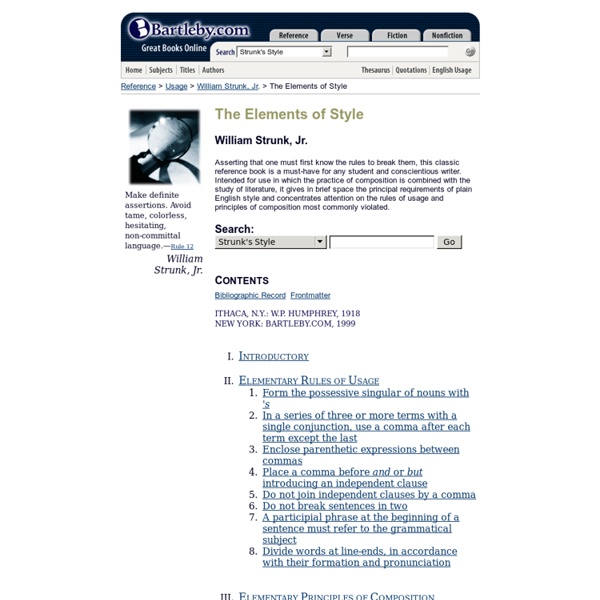



English grammar resources Do you have a question about the correct usage of the semi-colon or how to place relative adverbs in a sentence? If so, you've come to the right place! The edufind.com English grammar guide is a complete reference on the rules of English usage. Every grammatical rule is explained in clear, simple language with several examples and, when necessary, counter-examples. The grammatical rules covered by this guide are categorized by part of speech. TEN SIMPLE KEYS TO PLOT STRUCTURE Structure is something that every agent and executive in Hollywood talks about, and that all of us teachers/authors/consultants/gurus/whatever go on and on about, to the point that it can seem complicated, intricate, mysterious and hard to master. So I want present plot structure in a way that simplifies it – that will at least give you a starting point for properly structuring your screenplay without overwhelming you with rules and details and jargon. Here are what I consider ten key elements of structure – ten ways of looking at structure that will immediately improve the emotional impact – and commercial potential – of your script.
Cliche Finder Have you been searching for just the right cliché to use? Are you searching for a cliché using the word "cat" or "day" but haven't been able to come up with one? Just enter any words in the form below, and this search engine will return any clichés which use that phrase... Over 3,300 clichés indexed! What exactly is a cliche?See my definition Do you know of any clichés not listed here?
40th Anniversary: The New York Books Canon New York is a hypertextualized city. By 6 a.m., our commuters have smudged more words off their papers than most cities read all day. How to even begin identifying a canon? While reading, I plotted candidates along two mystical axes: one of all-around literary merit, and the other of “New Yorkitude”—the degree to which a book allows itself to obsess over the city. Robert Caro’s The Power Broker just about maxes out both axes; others perseverate so memorably on smaller aspects of city life that they had to be included. There were, of course, regrettable omissions: Jimmy Breslin is a quintessential New York writer whose main strength is not books; Puzo’s Godfather was better as a movie.
Reported speech We use reported speech when we want to tell someone what someone said. We usually use a reporting verb (e.g. say, tell, ask, etc.) and then change the tense of what was actually said in direct speech. So, direct speech is what someone actually says?
MULTPILE WRITING SAMPLES Writers - especially screenwriters - are frequently told that before pursuing representation, they should have at least two completed writing samples. Agents want to be certain you're committed to writing as a career, and aren't just tossing them something you knocked off in a weekend. They want to see how you can develop a variety of characters, stories and even genres.
Sounds Familiar? What you can hear You can listen to 71 sound recordings and over 600 short audio clips chosen from two collections of the British Library Sound Archive: the Survey of English Dialects and the Millennium Memory Bank. You’ll hear Londoners discussing marriage and working life, Welsh teenagers talking with pride about being bilingual and the Aristocracy chatting about country houses. You can explore the links between present-day Geordie and our Anglo-Saxon and Viking past or discover why Northern Irish accents are a rich blend of seventeenth century English and Scots. You can study changes in pronunciation among the middle classes or find out how British Asians express their linguistic identity.
Recipes for the hot days Wow. When I first decided to host an event, I convinced myself that I'd be satisfied with even ten entries. Never in a million years would I have expected 64 of you to participate! Free Online Lessons in English Grammar, Vocabulary and Phrases Select an exercise below to practise your grammar, vocabulary and use of phrases. They are organised into three levels: Elementary: suitable for students from levels A2 to B1 on the CEF (Common European Framework) Intermediate: suitable for students from B1 to B2 on the CEF Advanced: suitable for students from C1 and C2 on the CEF The exercises on these pages were all written by International House Bristol staff and you will not find the same exercises on any other site or in any coursebook.
MASTERING OUTER MOTIVATION If you've ever heard me lecture, or ever read almost anything I've written, you've heard me talk about Outer Motivation -- a clear finish line that the hero is desperate to cross by the end of the story. All fiction is built on the emotional power of DESIRE and CONFLICT. And almost all successful movies and novels define a VISIBLE goal that the hero or protagonist is desperate to achieve. The pursuit of this goal defines your story concept, determines plot structure, and is the necessary through-line from which your hero’s INNER journey – and your story’s theme – will emerge.